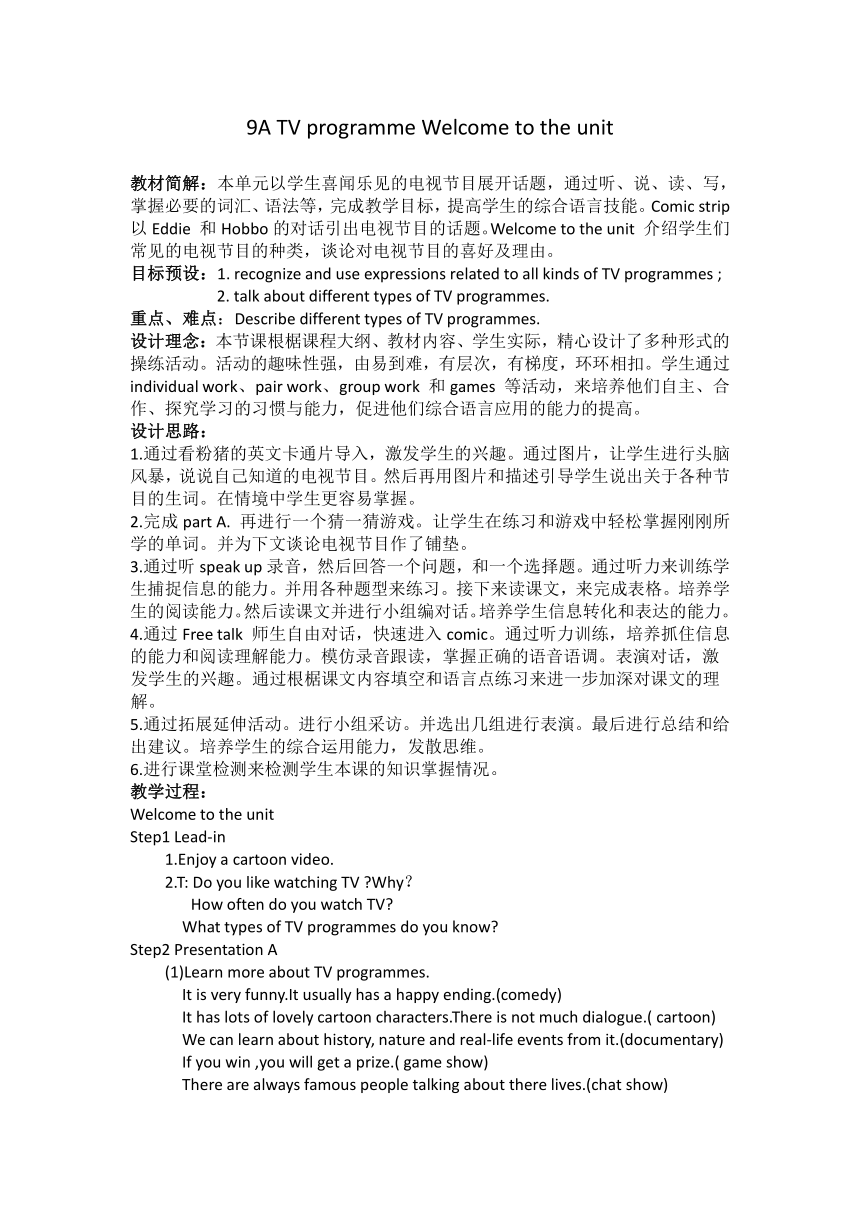牛津译林版九年级上册 Unit6 TV programmes Welcome to the unit 教案
文档属性
| 名称 | 牛津译林版九年级上册 Unit6 TV programmes Welcome to the unit 教案 |  | |
| 格式 | doc | ||
| 文件大小 | 39.0KB | ||
| 资源类型 | 教案 | ||
| 版本资源 | 牛津译林版 | ||
| 科目 | 英语 | ||
| 更新时间 | 2022-09-02 19:52:14 | ||
图片预览

文档简介
9A TV programme Welcome to the unit
教材简解:本单元以学生喜闻乐见的电视节目展开话题,通过听、说、读、写,掌握必要的词汇、语法等,完成教学目标,提高学生的综合语言技能。Comic strip 以Eddie 和Hobbo的对话引出电视节目的话题。Welcome to the unit 介绍学生们常见的电视节目的种类,谈论对电视节目的喜好及理由。
目标预设:1. recognize and use expressions related to all kinds of TV programmes ;
2. talk about different types of TV programmes.
重点、难点:Describe different types of TV programmes.
设计理念:本节课根椐课程大纲、教材内容、学生实际,精心设计了多种形式的操练活动。活动的趣味性强,由易到难,有层次,有梯度,环环相扣。学生通过individual work、pair work、group work 和games 等活动,来培养他们自主、合作、探究学习的习惯与能力,促进他们综合语言应用的能力的提高。
设计思路:
1.通过看粉猪的英文卡通片导入,激发学生的兴趣。通过图片,让学生进行头脑风暴,说说自己知道的电视节目。然后再用图片和描述引导学生说出关于各种节目的生词。在情境中学生更容易掌握。
2.完成part A. 再进行一个猜一猜游戏。让学生在练习和游戏中轻松掌握刚刚所学的单词。并为下文谈论电视节目作了铺垫。
3.通过听speak up录音,然后回答一个问题,和一个选择题。通过听力来训练学生捕捉信息的能力。并用各种题型来练习。接下来读课文,来完成表格。培养学生的阅读能力。然后读课文并进行小组编对话。培养学生信息转化和表达的能力。
4.通过Free talk 师生自由对话,快速进入comic。通过听力训练,培养抓住信息
的能力和阅读理解能力。模仿录音跟读,掌握正确的语音语调。表演对话,激
发学生的兴趣。通过根椐课文内容填空和语言点练习来进一步加深对课文的理解。
5.通过拓展延伸活动。进行小组采访。并选出几组进行表演。最后进行总结和给出建议。培养学生的综合运用能力,发散思维。
6.进行课堂检测来检测学生本课的知识掌握情况。
教学过程:
Welcome to the unit
Step1 Lead-in
1.Enjoy a cartoon video.
2.T: Do you like watching TV Why?
How often do you watch TV
What types of TV programmes do you know
Step2 Presentation A
(1)Learn more about TV programmes.
It is very funny.It usually has a happy ending.(comedy)
It has lots of lovely cartoon characters.There is not much dialogue.( cartoon)
We can learn about history, nature and real-life events from it.(documentary)
If you win ,you will get a prize.( game show)
There are always famous people talking about there lives.(chat show)
We can enjoy interesting stories.(drama series)
(2) Match the scenes with the pictures.Finish Part A.
(3)Have a guessing game.
Step3 Speak up
1.Listen and answers.
(1).How many TV programmes are they talking about
(2)Sandy and her friends are talking about
A. Documentary B chat show C game show D comedy E. cartoon F.drama series
2.Read and answer:
Names Favourite types of TV programme reasons
Millie
Daniel
Amy
Simon
3.Practice
(1) Read the dialogue.
(2) Make another dialogue according to the dialogue
Step 4 Comic strip
1.Lead-in
Free talk
T: Do you often stay at home at weekends Do you get bored with staying at home all day
T: What do you think Eddie does at home every day
2. Listen and answer the questions
(1)T: Is Eddie getting bored with staying at home all day
(No .)
(2)T: Why not
(Because Eddie thinks he is busy .)
(3)T: Does Hobo agree with Eddie
(No , he thinks Eddie has nothing to do .)
(4)T: What does Eddie do every day
(He eats , sleeps and watches TV every day .)
3.Practice
(1)T: Repeat the Comic strip after the tape , pay attention to pronunciation and intonation.
(2) Read the dialogue in roles
(3) Fill in the blanks.
(4) Learn some important language points in the dialogue.
(5) Make dialogues and then act out
Step 5 Activity
Have an interview in groups。Is it good for students to watch TV
Conclusion: Students can watch TV in their spare time,but not too much.
Some advice:
1. Watch less TV.
2.Watch valuable programmes.
3. Try to achieve a balance between your study and TV .Study comes first.
教材简解:本单元以学生喜闻乐见的电视节目展开话题,通过听、说、读、写,掌握必要的词汇、语法等,完成教学目标,提高学生的综合语言技能。Comic strip 以Eddie 和Hobbo的对话引出电视节目的话题。Welcome to the unit 介绍学生们常见的电视节目的种类,谈论对电视节目的喜好及理由。
目标预设:1. recognize and use expressions related to all kinds of TV programmes ;
2. talk about different types of TV programmes.
重点、难点:Describe different types of TV programmes.
设计理念:本节课根椐课程大纲、教材内容、学生实际,精心设计了多种形式的操练活动。活动的趣味性强,由易到难,有层次,有梯度,环环相扣。学生通过individual work、pair work、group work 和games 等活动,来培养他们自主、合作、探究学习的习惯与能力,促进他们综合语言应用的能力的提高。
设计思路:
1.通过看粉猪的英文卡通片导入,激发学生的兴趣。通过图片,让学生进行头脑风暴,说说自己知道的电视节目。然后再用图片和描述引导学生说出关于各种节目的生词。在情境中学生更容易掌握。
2.完成part A. 再进行一个猜一猜游戏。让学生在练习和游戏中轻松掌握刚刚所学的单词。并为下文谈论电视节目作了铺垫。
3.通过听speak up录音,然后回答一个问题,和一个选择题。通过听力来训练学生捕捉信息的能力。并用各种题型来练习。接下来读课文,来完成表格。培养学生的阅读能力。然后读课文并进行小组编对话。培养学生信息转化和表达的能力。
4.通过Free talk 师生自由对话,快速进入comic。通过听力训练,培养抓住信息
的能力和阅读理解能力。模仿录音跟读,掌握正确的语音语调。表演对话,激
发学生的兴趣。通过根椐课文内容填空和语言点练习来进一步加深对课文的理解。
5.通过拓展延伸活动。进行小组采访。并选出几组进行表演。最后进行总结和给出建议。培养学生的综合运用能力,发散思维。
6.进行课堂检测来检测学生本课的知识掌握情况。
教学过程:
Welcome to the unit
Step1 Lead-in
1.Enjoy a cartoon video.
2.T: Do you like watching TV Why?
How often do you watch TV
What types of TV programmes do you know
Step2 Presentation A
(1)Learn more about TV programmes.
It is very funny.It usually has a happy ending.(comedy)
It has lots of lovely cartoon characters.There is not much dialogue.( cartoon)
We can learn about history, nature and real-life events from it.(documentary)
If you win ,you will get a prize.( game show)
There are always famous people talking about there lives.(chat show)
We can enjoy interesting stories.(drama series)
(2) Match the scenes with the pictures.Finish Part A.
(3)Have a guessing game.
Step3 Speak up
1.Listen and answers.
(1).How many TV programmes are they talking about
(2)Sandy and her friends are talking about
A. Documentary B chat show C game show D comedy E. cartoon F.drama series
2.Read and answer:
Names Favourite types of TV programme reasons
Millie
Daniel
Amy
Simon
3.Practice
(1) Read the dialogue.
(2) Make another dialogue according to the dialogue
Step 4 Comic strip
1.Lead-in
Free talk
T: Do you often stay at home at weekends Do you get bored with staying at home all day
T: What do you think Eddie does at home every day
2. Listen and answer the questions
(1)T: Is Eddie getting bored with staying at home all day
(No .)
(2)T: Why not
(Because Eddie thinks he is busy .)
(3)T: Does Hobo agree with Eddie
(No , he thinks Eddie has nothing to do .)
(4)T: What does Eddie do every day
(He eats , sleeps and watches TV every day .)
3.Practice
(1)T: Repeat the Comic strip after the tape , pay attention to pronunciation and intonation.
(2) Read the dialogue in roles
(3) Fill in the blanks.
(4) Learn some important language points in the dialogue.
(5) Make dialogues and then act out
Step 5 Activity
Have an interview in groups。Is it good for students to watch TV
Conclusion: Students can watch TV in their spare time,but not too much.
Some advice:
1. Watch less TV.
2.Watch valuable programmes.
3. Try to achieve a balance between your study and TV .Study comes first.
